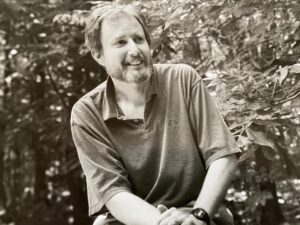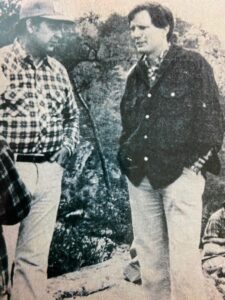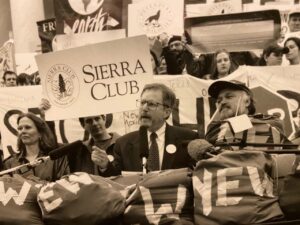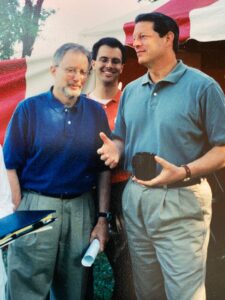Summary
Robbie Cox's oral history is significant for detailing the environmental activism and political strategies of one of the most influential volunteers in recent Sierra Club history. Robbie’s decades of environmental activism provides a lens on ways the U.S. environmental movement has evolved over time from its early focus on wild lands, to concerns about human health, to engagement on issues of environmental justice, to confronting the modern complexities of climate change.
New oral history: “Robert Cox: Sierra Club President 1994-96, 2000-01, and 2007-08, on Environmental Communications and Strategy”
Video clip from Robert Cox’s oral history on the Sierra Club’s environmental justice work with Jesus People Against Pollution (JPAP) in 1994

Robert Cox is a scholar and a gentleman. He also has a fire burning in his belly for protecting nature, confronting injustice, and empowering people, which fueled his long-time leadership in environmental politics, strategy, and influential communication. Robbie Cox served three times as president of the national Sierra Club in 1994-96, 2000-01, and 2007-08. He is Professor Emeritus at the University of North Carolina at Chapel Hill (UNC-CH), and as a scholar of activist rhetoric, Cox helped found the academic field of environmental communication.
Robbie and I recorded nearly eleven hours of his life history over Zoom during five interview sessions in September 2020, during the early months of the COVID-19 pandemic. Robbie’s inspiring stories of environmental activism produced a 253-page transcript, which includes an appendix with several photographs. The stories that Robbie shared in his oral history also emphasized the incredibly high stakes for our present moment of environmental politics, rhetoric, and civic engagement.
Cox was born in September 1945, in Hinton, West Virginia, where his early influences included roaming Appalachian forests and rivers as well as his family’s history of union organizing and work toward social justice. He was recruited to the debate team at the University of Richmond where, from 1963 to 1967, he studied communication, philosophy, history, and religion while also participating in civil rights protests. In 1970, Cox earned his Ph.D. in classical rhetoric studies from the University of Pittsburgh with a dissertation on the rhetorical structures of the Vietnam antiwar movement in which he actively participated. From 1971 to 2010, Cox was a Professor in the Department of Communication at UNC-CH where he helped establish the field of environmental communication and focused his research and teaching on argumentation, rhetorical theory, and social movements. Cox married Professor Julia Wood in 1975 when she also joined the UNC-CH faculty in the Department of Communication.
Video clip from Robert Cox’s oral history on first joining the Sierra Club in 1979

Upon Dr. Wood’s suggestion, Cox joined the Sierra Club in 1979 and, over time, he earned leadership positions at every level in the Club: as chair of the Research Triangle Group, as chair of the North Carolina Chapter, and as an elected member to the national board of directors for most years between 1993 and 2013, including three times as president of the national Sierra Club. Cox made significant contributions to passage in the US Congress of the North Carolina Wilderness Bill, to the Sierra Club’s early engagements in the environmental justice movement, to restructuring both the Club’s internal governance and its volunteer structure, as well as helping lead Sierra Club engagements in national politics, particularly during his times as Club president. In this oral history, Cox discusses all of the above, with a focus on leveraging influential communication and strategy, while also sharing his experiences hiking and trekking in the Himalayas, in the mountains of Europe, and in the Appalachian Mountains.
Robbie Cox’s oral history is significant for detailing the environmental activism and political strategies of one of the most influential volunteers in recent Sierra Club history. Some of the themes throughout Robbie’s oral history include the profoundly democratic nature of the Sierra Club, details on the Club’s geographically diverse grassroots activism, as well as numerous ways that volunteer environmentalists work together to shape state and national legislation. Robbie also reconstructed the ways he balanced his double life as UNC professor with his life as an environmental activist, especially through his work in Sierra Club media campaigns. He recounted his decades as a nationally elected volunteer leader in the Sierra Club, as told through the perspective of an academic scholar of rhetoric and communications. And throughout, Robbie shared stories of direct action for environmental causes at all levels of Sierra Club engagement, from local to national.
Video clip from Robert Cox’s oral history on passing the North Carolina Wilderness Act in 1984
The in-depth, life-history approach used in this oral history reveals ways that Robbie’s personal influences and his engagements in the Sierra Club evolved over time. For instance, Robbie’s family history of labor activism instilled in him the power of people and the importance of social justice. Similarly, his participation on debate teams shaped substantially his education and academic work, while also playing a central role throughout his life as a political and environmental activist. Robbie’s interview also explored the Sierra Club’s and his own personal engagements with environmental justice, including his attendance at the First National People of Color Environmental Justice Leadership Summit in 1991, his leveraging of media in the national Sierra Club’s partnership with “Jesus People Against Pollution” in Mississippi, as well as his experiences on toxic tours of colonias in Matamoro, Mexico, along with other actions against the negative results of neoliberal free trade agreements.

Robbie also shared insider details on several significant moments in the Sierra Club’s recent history. He recounted the Club’s severe financial crises in the 1990s that resulted in his work to reorganize the Club’s internal governance through Project Renewal as well as the Club’s volunteer structures via Project ACT. Robbie recounted his central role in the Sierra Club’s efforts to combat the de-regulatory and anti-environmental Congressional agenda in wake of Newt Gingrich’s Republican take-over of Congress in the 1990s, as well as Robbie’s personal role in securing the Sierra Club’s endorsement of Al Gore, for whom Robbie campaigned in 2000. Robbie also detailed the central role he played in the Groundswell Sierra campaign in the early 2000s to resist a take-over of the Sierra Club by anti-immigration and white supremacist forces. And as the world warms and the seas rise, Robbie discussed ways that the Sierra Club has confronted the compounding crises of climate change in the twenty-first century. Robbie’s decades of environmental activism provides a lens on ways the environmental movement has evolved over time from its early focus on wild lands, to concerns about human health, to engagement on issues of environmental justice, to the modern complexities of climate change. Robbie also reflects on the contemporary Sierra Club’s internal and external challenges in its ongoing work for equity, inclusion, and justice.
Video clip from Robert Cox’s oral history on delivering to Congress the Environmental Bill of Rights with 1.2 million signatures in 1995

Back in the summer of 2020, when I spoke with Carl Pope, former Sierra Club executive director, to prepare for Robbie’s oral history, Pope recalled Robbie’s exceptional leadership and effectiveness. When “Professor Cox” first won election to the national Sierra Club board of directors in the 1990s, Pope described Robbie’s presence as “immediately noticeable.” Pope told me how Robbie used his expertise in rhetoric to unify people and advance proposals for environmental action. “You could see Robbie work at a board meeting,” Pope remembered. “When he wanted to get the board to agree, he would offer some initial proposal tentatively, then let folks respond to it and let the room talk. Then he’d come back in and make the same proposal, but he changed two words to see if that worked. He’d keep playing with the proposal and make changes rhetorically, until he got something that would work for everyone.” The Sierra Club’s board of directors come increasingly from a variety of backgrounds across the United States. All directors are volunteers, not employed staff, but like much of the Sierra Club staff, many Club directors consider themselves to be full-time environmental activists. As Carl Pope noted, however, most Sierra Club directors “are not professional communicators. People would talk past each other. Robbie’s skill on the board lubricated that process, which was phenomenally helpful. If anyone wanted to get something done, you asked Robbie.” Indeed, Robbie Cox got things done.
Pope also described Robbie as a kind of environmental philosopher. “He wasn’t ideological,” Pope explained, “but surely, he had his own vision of where the Club should go.” Now, with this publication of Robbie Cox’s oral history, you too can have him tell you in his own words about his visions for the Sierra Club and the ways he mobilized constituencies to make a reality of his visions for environmental protection, political power, and justice.
ABOUT THE ORAL HISTORY CENTER
The Oral History Center of The Bancroft Library preserves voices of people from all walks of life, with varying political perspectives, national origins, and ethnic backgrounds. We are committed to open access and our oral histories and interpretive materials are available online at no cost to scholars and the public. You can find our oral histories from the search feature on our home page. Search by name, keyword, and several other criteria. Sign up for our monthly newsletter featuring think pieces, new releases, podcasts, Q&As, and everything oral history. Access the most recent articles from our home page or go straight to our blog home.
Please consider making a tax-deductible donation to the Oral History Center if you’d like to see more work like this conducted and made freely available online. While we receive modest institutional support, we are a predominantly self-funded research unit of The Bancroft Library. We must raise the funds to cover the cost of all the work we do, including each oral history. You can give online, or contact us at ohc@berkeley.edu for more information about our funding needs for present and future projects.